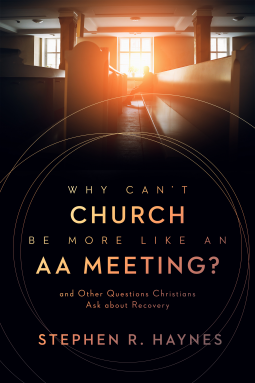
Why Can't Church Be More Like an AA Meeting?
And Other Questions Christians Ask about Recovery
by Stephen R. Haynes
This title was previously available on NetGalley and is now archived.
Send NetGalley books directly to your Kindle or Kindle app
1
To read on a Kindle or Kindle app, please add kindle@netgalley.com as an approved email address to receive files in your Amazon account. Click here for step-by-step instructions.
2
Also find your Kindle email address within your Amazon account, and enter it here.
Pub Date Oct 26 2021 | Archive Date Jul 12 2021
Talking about this book? Use #WhyCantChurchBeMoreLikeanAAMeeting #NetGalley. More hashtag tips!
Description
Do Christians need recovery? Or is recovery something needed by the church itself?
Addiction—whether to a substance or to a behavior—is a problem within faith communities, just like it is everywhere else. But because churches are rarely experienced as safe places for dealing with addiction, co-addiction, or the legacy of family dysfunction, Christians tend to seek recovery from these conditions in Twelve-Step fellowships. Once they become accustomed to the ethos of vulnerability, acceptance, and healing that these fellowships provide, however, they are often left feeling that the church has failed them, with many asking: why can’t church be more like an AA meeting?
Inspired by his own quest to find in church the sort of mutual support and healing he discovered in Twelve-Step fellowships, Stephen Haynes explores the history of Alcoholics Anonymous and its relationship to American Christianity. He shows that, while AA eventually separated from the Christian parachurch movement out of which it emerged, it retained aspects of Christian experience that the church itself has largely lost: comfort with brokenness and vulnerability, an emphasis on honesty and transparency, and suspicion toward claims to piety and respectability. Haynes encourages Christians to reclaim these distinctive elements of the Twelve-Step movement in the process of “recovering church.” He argues that this process must begin with he calls “Step 0,” which, as he knows from personal experience, can be the hardest step: the admission that, despite appearances, we are not fine.
Table of Contents
1. Why Can’t Sunday Be More Like Saturday? (It’s Not What You Think)
2. What Can the Church Learn from AA? (Who’s Asking?)
3. Do Christians Need Recovery? (Not Until They Do)
4. Are AA and the Church Allies or Competitors? (Maybe Both)
5. What Is Recovery Anyway? (It’s Complicated)
6. Is Recovery Anti-Christian? (Nope)
7. Is Recovery Biblical? (Sort Of)
8. Can Christians Embrace Recovery? (Apparently)
9. How Are Christians Trying to Reclaim What They Gave AA? (Let Us Count the Ways)
10. What Does the Church Bring to Recovery? (In a Word, Theology)
11. Does Twelve-Step Recovery Work? (Define “Work”)
12. What about Sex Addiction? (Is That Even a Thing?)
Epilogue: When Is Recovery Finished? (When You Are)
Available Editions
| EDITION | Paperback |
| ISBN | 9780802878854 |
| PRICE | |



